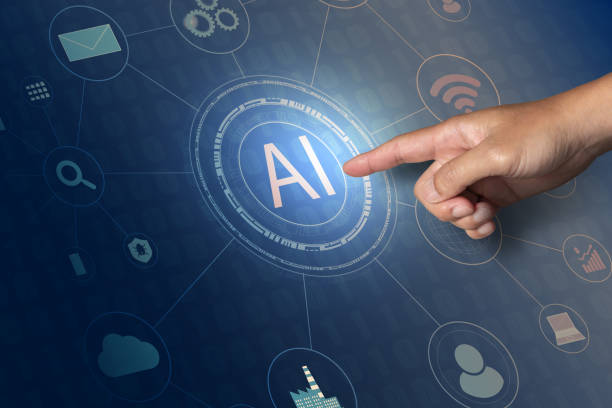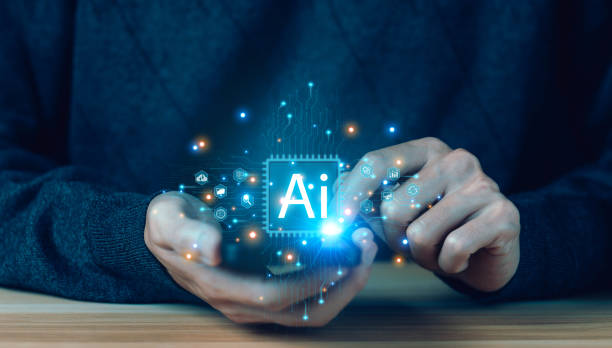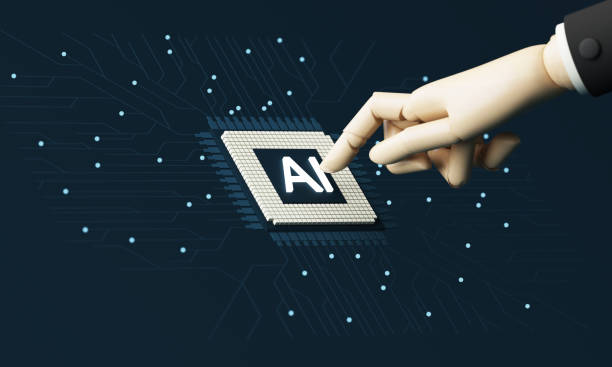What is Artificial Intelligence and How Does it Work?
Artificial Intelligence (AI) refers to the ability of a computer system to perform tasks that typically require human intelligence.
These tasks can include learning, reasoning, problem-solving, understanding natural language, and pattern recognition.
In other words, the goal of AI is to create machines that can think, learn, and make decisions independently.
AI functions based on complex algorithms and mathematical models that allow machines to analyze data and learn from it.
For example, in machine learning, algorithms are provided with a large amount of data to identify patterns and relationships within the data.
These patterns are then used to make predictions or decisions about new data.
AI has applications in various fields such as medicine, finance, transportation, and manufacturing and is rapidly developing.
Deep learning, a branch of AI, uses deep neural networks to process complex data and achieve more accurate results.
Machine learning plays an important role in recent advancements in AI.
One of the most important aspects of AI is its ability to automate tasks.
Machines can perform tasks that previously required human intervention, which can lead to increased productivity and reduced costs.
However, the development of AI also poses challenges, including issues related to data privacy, security, and the potential impact on the job market.
Do you have an online store but your sales are not as expected? Rasaweb solves your problem forever with professional online store designs!
✅ Significant increase in conversion rate and sales
✅ Unparalleled user experience for your customers
⚡ Click to get free consultation with Rasaweb!
Types of Artificial Intelligence: Approaches and Applications
There are different types of artificial intelligence, each with its own approaches and applications.
One of the main classifications is the distinction between Narrow AI and General AI.
Narrow AI is designed to perform a specific task and performs well in that limited area.
Examples of Narrow AI include facial recognition systems, voice assistants such as Siri and Alexa, and product recommendation algorithms in online stores.
These systems are highly specialized and cannot perform other tasks well.
Click here to preview your posts with PRO themes ››
In contrast, General AI refers to a system that can perform any task that a human is capable of doing.
General AI is still in the early stages of development, and no complete system with this level of intelligence has been built so far.
The goal of developing General AI is to create machines that can think, learn, and make decisions independently, just like humans.
In addition, there are different approaches to AI development, including machine learning, deep learning, natural language processing, and expert systems.
Each of these approaches uses its own techniques and algorithms to solve problems and perform tasks.
Choosing the right approach depends on the type of problem and the available data.
For example, in Natural Language Processing (NLP), algorithms are used to understand and generate human language.
This technology is used in applications such as machine translation, sentiment analysis, and chatbots.
Expert systems also use specialized knowledge to solve complex problems and are typically used in fields such as medicine and engineering.
Ultimately, the development of AI requires a combination of these approaches and techniques to create systems that can operate effectively and efficiently.
Practical Applications of Artificial Intelligence in Various Industries
Artificial intelligence is widely used in various industries and has a significant impact on how things are done.
In the field of medicine, AI is used for disease diagnosis, drug development, and providing personalized healthcare.
Machine learning algorithms can analyze medical images such as MRI and CT scans and detect signs of disease with high accuracy.
In the financial industry, AI is used to identify fraud, manage risk, and provide financial advisory services.
AI systems can identify suspicious patterns in financial transactions and prevent financial crimes.
In the field of manufacturing, AI is used to optimize production processes, control quality, and predict equipment failures.
Robots equipped with AI can perform repetitive and dangerous tasks and increase productivity.
In the transportation industry, AI is used to develop self-driving cars, optimize transportation routes, and manage traffic.
Self-driving cars use sensors and AI algorithms to understand their surroundings and drive without the need for human intervention.
In addition, AI is used in the field of education to provide personalized training and assess student performance.
AI systems can identify the learning needs of each student and provide appropriate educational content.
Click here to preview your posts with PRO themes ››
In the retail sector, AI is used to improve customer experience, optimize inventory, and provide personalized recommendations.
AI algorithms can analyze customer shopping patterns and suggest related products to them.
These applications are just examples of the widespread applications of AI in various industries, and with the advancement of technology, newer applications are emerging.
| Industry | AI Application |
|---|---|
| Medicine | Disease diagnosis, drug development |
| Finance | Fraud detection, risk management |
| Manufacturing | Process optimization, quality control |
| Transportation | Self-driving cars, route optimization |
Machine Learning and Deep Learning: Concepts and Differences
Machine Learning and Deep Learning are two related but different concepts in the field of AI.
Machine learning refers to a set of algorithms that allow computers to learn from data without being explicitly programmed.
In machine learning, algorithms use training data to identify patterns and relationships within the data and use these patterns to make predictions or decisions about new data.
There are different types of machine learning algorithms, including supervised learning, unsupervised learning, and reinforcement learning.
In supervised learning, the algorithm is trained using labeled data, while in unsupervised learning, the algorithm must identify patterns without any labels.
Reinforcement learning also allows the algorithm to learn by trial and error and receiving rewards or penalties.
Deep learning is a subset of machine learning that uses deep neural networks with multiple layers to analyze data.
Deep neural networks are inspired by the structure of the human brain and are capable of processing complex data with high accuracy.
Deep learning is particularly useful in areas such as image recognition, natural language processing, and speech recognition.
The main difference between machine learning and deep learning is in how features are extracted from the data.
In traditional machine learning, feature engineers must manually extract important features from the data, while in deep learning, neural networks automatically extract important features from the data.
This makes deep learning more suitable for processing complex and voluminous data.
For example, in image recognition, deep neural networks can automatically identify patterns in images and recognize different objects with high accuracy.
This capability is used in applications such as self-driving cars, facial recognition systems, and medical diagnostics.
In summary, machine learning and deep learning are powerful tools in the field of AI that allow computers to learn from data and perform complex tasks.
Do you know that a weak corporate website loses many opportunities every day? Solve this problem forever with a professional corporate website design by Rasaweb!
✅ Create a powerful and reliable image of your brand
✅ Targeted attraction of new customers and increased sales
⚡ [Get a free website design consultation]
Challenges and Limitations of Artificial Intelligence
Despite significant progress, artificial intelligence still faces numerous challenges and limitations.
One of the most important challenges is the need for large and high-quality data to train algorithms.
AI algorithms require voluminous and diverse data to learn and improve their performance.
If the training data is incomplete, inaccurate, or biased, the algorithm’s performance will also be affected and will not provide accurate results.
Another challenge is the issue of interpretability.
Many AI algorithms, especially deep neural networks, act as black boxes, and it is difficult to understand how they make decisions.
This issue can be problematic in areas such as medicine and law, as AI decisions must be explainable and justifiable.
In addition, issues related to data privacy and security are also among the important challenges of AI.
AI algorithms require users’ personal data for learning, which can lead to privacy violations.
Also, AI systems can be attacked and manipulated, which can lead to serious consequences.
Another limitation of AI is the inability to understand and reason like humans.
AI systems typically perform well in a specific context but cannot think and make decisions as generally as humans do.
This causes AI to face problems when dealing with new and unexpected issues.
Ethical issues are also among the important challenges of AI.
The use of AI in areas such as autonomous weapons and mass surveillance can have serious consequences for society.
Therefore, it is necessary that the development and use of AI be done considering ethical and social issues.
Finally, overcoming these challenges and limitations requires a joint effort by researchers, policymakers, and society to fully benefit from the potential of AI and prevent its potential risks.
The Future of Artificial Intelligence: Opportunities and Threats
The future of artificial intelligence is full of potential opportunities and threats.
With the advancement of technology, AI can create significant improvements in various fields and make human life easier.
In the field of medicine, AI can help to diagnose diseases more accurately and quickly and provide personalized treatments.
In the transportation industry, self-driving cars can increase road safety and reduce traffic.
In the field of education, AI can help to provide personalized training and more accurately assess student performance.
AI can help to solve complex global problems such as climate change and poverty.
However, the development of AI also poses threats.
One of the most important threats is the potential impact on the labor market.
With the automation of tasks by AI, many jobs may be lost, and there will be a need for retraining and the creation of new jobs.
Another threat is the issue of data privacy and security.
With the collection and analysis of personal data by AI systems, the risk of privacy violations and data abuse increases.
In addition, the use of AI in autonomous weapons can lead to wars without human intervention and have serious consequences for global security.
To face these threats and benefit from the opportunities of AI, it is necessary that the development and use of AI be done considering ethical and social issues.
There is a need to regulate appropriate regulations and laws to maintain data privacy, prevent the misuse of AI, and ensure the responsible use of this technology.
Also, it is necessary to pay attention to retraining the workforce and creating new jobs to reduce the negative effects of AI on the labor market.
With proper planning and management, the potential of AI can be fully utilized and its potential risks can be prevented.
Skills Required to Enter the World of Artificial Intelligence
Entering the world of artificial intelligence requires a set of technical and non-technical skills.
One of the most important skills is knowledge of mathematics and statistics.
AI algorithms are based on mathematical and statistical concepts, so having a deep understanding of these concepts is essential for developing and optimizing algorithms.
Another skill is programming knowledge.
Programming languages such as Python, R, and Java are widely used in AI, so familiarity with these languages is essential for implementing and testing algorithms.
In addition, knowledge of machine learning and deep learning is also an essential skill for entering the world of AI.
Familiarity with different machine learning algorithms and deep neural networks and how to use them to solve various problems is essential.
Non-technical skills also play an important role in success in the world of AI.
One of the most important skills is problem-solving ability.
The development and use of AI requires the ability to identify complex issues and provide innovative solutions.
Another skill is the ability to work in a team.
AI projects usually require collaboration between people with different expertise, so the ability to work in a team and communicate effectively with others is essential.
In addition, communication skills also play an important role in conveying ideas and results to others.
The ability to provide reports and presentations clearly and concisely is essential to gaining support and cooperation from others.
You can use different resources to acquire these skills.
Online courses, books, scientific articles, and conferences are good resources for learning AI concepts and techniques.
Also, participating in practical projects and internships can help you put your skills into practice.
By acquiring these skills, you can effectively operate in the world of AI and contribute to the development and progress of this technology.
Key Tools for Artificial Intelligence Development
The development of artificial intelligence requires the use of various tools and frameworks that help developers effectively implement and test their algorithms and models.
One of the most important tools is Python.
Python is a high-level and powerful programming language that is widely used in AI.
Python has numerous libraries that are very useful for developing machine learning and deep learning algorithms.
Libraries such as NumPy, Pandas, and Scikit-learn are used to process data and implement machine learning algorithms.
TensorFlow and PyTorch are two popular frameworks for developing deep neural networks.
TensorFlow is developed by Google and is a powerful and flexible framework that is used for developing large-scale deep learning models.
PyTorch is developed by Facebook and is a user-friendly framework suitable for research and rapid development.
Both of these frameworks have numerous facilities and tools that help developers to effectively train and test their models.
In addition, there are other tools for AI development, including Keras, Theano, and Caffe.
Keras is a high-level API for building neural networks that runs on TensorFlow and Theano.
Other tools such as Jupyter Notebook are also very useful for developing and testing AI code.
Jupyter Notebook is an interactive environment that allows developers to execute their code step by step and see the results.
This tool is very suitable for training, research, and rapid development.
In addition, data management tools such as Apache Spark and Hadoop are also used for processing voluminous data and training AI models on a large scale.
The choice of the right tool depends on the type of project and the needs of the developers.
Using these tools and frameworks, developers can effectively implement and test AI algorithms and models and contribute to the development and progress of this technology.
| Tool | Application |
|---|---|
| Python | Programming language |
| TensorFlow | Deep learning framework |
| PyTorch | Deep learning framework |
| Jupyter Notebook | Interactive development environment |
Are you dissatisfied with the low sales of your online store?
Rasaweb is your solution for having a professional and high-selling online store.
✅ Significant increase in sales and revenue
✅ Easy and enjoyable shopping experience for customers
⚡ Get a free consultation from Rasaweb right now!
Ethical Issues in Artificial Intelligence
Artificial intelligence (AI) is becoming an integral part of our lives, but its rapid advancement raises important ethical questions that must be addressed.
One of the main issues is bias in algorithms.
If the data used to train AI is biased, the algorithm will also learn the bias and make unfair decisions.
For example, a facial recognition system may perform worse at recognizing the faces of people with dark skin if its training data includes more faces of people with light skin.
This can lead to discrimination in areas such as hiring, lending, and law enforcement.
Therefore, it is important that training data be carefully reviewed and that bias is prevented.
Another issue is accountability for AI decisions.
If an AI system makes a mistake and causes damage, who is responsible? Is it the developer, the user, or the AI system itself? This is a complex question that still has no definitive answer.
Some believe that developers should be responsible because they designed the algorithm and could have prevented the error.
Others believe that users should be responsible because they have employed the AI system and should be aware of its potential risks.
Finally, some believe that the AI system itself should be responsible, but this idea is still in the early stages of research.
In addition, issues related to privacy and security are also among the important ethical issues of AI.
AI systems require users’ personal data for learning, which can lead to privacy violations.
Also, AI systems can be attacked and manipulated, which can lead to serious consequences.
Therefore, it is necessary that the development and use of AI be done considering ethical and social issues.
For example, in the field of medicine, the use of AI for disease diagnosis can lead to improved accuracy and speed of diagnosis, but at the same time, it may lead to a reduction in the role of doctors and the loss of some jobs.
In the legal field, the use of AI to predict the likelihood of individuals committing crimes can lead to discrimination and violations of individuals’ rights.
Therefore, it is necessary that the development and use of AI be done considering these ethical and social issues and that appropriate laws and regulations be developed to prevent the misuse of this technology.
How to Get Started with Artificial Intelligence?
Getting started with artificial intelligence can be an exciting and challenging experience.
The first step is to learn the basic concepts of AI.
You can learn about basic concepts such as machine learning, deep learning, natural language processing, and neural networks by reading books, articles, and participating in online courses.
There are many educational resources available on the internet that can help you with this.
After learning the basic concepts, you can start learning the programming languages used in AI.
Python is one of the most popular programming languages for AI and has numerous libraries that are very useful for developing machine learning and deep learning algorithms.
Libraries such as NumPy, Pandas, and Scikit-learn are used to process data and implement machine learning algorithms.
TensorFlow and PyTorch are two popular frameworks for developing deep neural networks.
After learning the programming languages and frameworks you need, you can start working on small AI projects.
These projects can include building a simple image recognition system, a price prediction model, or a chatbot.
By working on these projects, you can put your skills into practice and face real challenges.
In addition, you can participate in open source AI projects and learn from the experiences of others.
Also, participating in AI competitions can help you assess your skills and compete with others.
Another way to get started with AI is to participate in internships and training courses that are held by various companies and organizations.
These internships and courses can help you get acquainted with the real work environment and benefit from the experiences of AI experts.
Finally, the most important thing to start working with AI is to have patience and perseverance.
AI is a complex and evolving field, and to succeed in this field, you need continuous effort and learning.
Frequently Asked Questions
| Question | Answer |
|---|---|
| 1. What is Artificial Intelligence (AI)? | It is a branch of computer science that aims to create machines capable of simulating human intelligence and performing tasks that require human thinking, such as learning, problem-solving, and decision-making. |
| 2. What are the main types of artificial intelligence? | They can be classified into weak artificial intelligence (Narrow AI) that focuses on a specific task, general artificial intelligence (General AI) that has comprehensive human capabilities, and super artificial intelligence (Super AI) that exceeds human intelligence. |
| 3. Mention some common artificial intelligence applications in our daily lives. | Includes voice assistants (such as Siri and Alexa), recommendation systems (such as Netflix and Amazon), self-driving cars, facial recognition systems, and spam filters. |
| 4. What is the difference between artificial intelligence and machine learning? | Artificial intelligence is the broader concept of creating intelligent machines, while machine learning is a subset of artificial intelligence that focuses on enabling systems to learn from data without explicit programming. |
| 5. What is deep learning? | It is a subset of machine learning that uses multi-layered artificial neural networks (deep neural networks) to process data and discover complex patterns, and is used in image and speech recognition. |
| 6. What are the most prominent benefits of artificial intelligence? | Improving efficiency and productivity, automating repetitive tasks, making better decisions based on big data analysis, and developing solutions to complex problems in fields such as medicine and science. |
| 7. What are the main challenges facing the development and deployment of artificial intelligence? | Includes the need for massive amounts of high-quality data, privacy and security issues, bias in data and algorithms, and high development and maintenance costs. |
| 8. Does artificial intelligence raise ethical or social concerns? | Yes, it raises concerns about privacy, algorithmic bias, job loss due to automation, responsibility for errors made by intelligent systems, and the need for a regulatory framework. |
| 9. How can artificial intelligence affect the future of the labor market? | It can lead to the automation of some routine tasks, but it will also create new jobs that require advanced skills in developing, operating, and maintaining artificial intelligence systems. |
| 10. What are some modern or promising technologies in the field of artificial intelligence? | Includes advanced natural language processing (NLP) (such as large language models like ChatGPT), computer vision, robotics, and generative AI. |
And other services of Rasa Web advertising agency in the field of advertising
Smart link building: A quick and efficient solution to attract customers with a focus on marketing automation.
Smart content strategy: Transform your site visits with the help of marketing automation.
Smart customer journey map: Transform sales growth with the help of precise audience targeting.
Smart custom software: A combination of creativity and technology for digital branding by customizing the user experience.
Smart marketing automation: An effective tool for user interaction with the help of precise audience targeting.
And more than hundreds of other services in the field of internet advertising, advertising consulting, and organizational solutions
Internet Advertising | Advertising Strategy | Advertorial Report
Resources
What is artificial intelligence?
,Understanding Artificial Intelligence
,Artificial Intelligence: A Complete Guide
,Artificial Intelligence Books on Amazon
? Are you ready to leap your business in the digital world? Rasaweb Digital Marketing Agency, with expertise in SEO, content marketing, and responsive website design, is with you to reach the peak.
📍 Tehran, Mirdamad Street, next to the Central Bank, Kazerun Jonobi Alley, Ramin Alley, No. 6
“`














